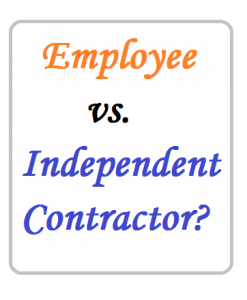 All employers who retain workers to perform jobs for their business need to establish if those workers are employees or independent contractors. Such classification continues to be one for which employers are commonly found to be out of compliance.
All employers who retain workers to perform jobs for their business need to establish if those workers are employees or independent contractors. Such classification continues to be one for which employers are commonly found to be out of compliance.
This occurs as a result of three ways:
- A random audit by the U.S. Dept of Labor
- A random audit by your state’s Dept of Labor
- A complaint by an individual that they are wrongly classified by an independent contractor, thereby triggering a government review

There are significant implications and negative consequences if an employer misclassifies a worker as an independent contractor—whether knowingly or not. Here are just two examples:
- Fines are subject to being doubled if non-compliance is determined to be willful or repeated
- A lawsuit by the family for life insurance payment in the event of the death of the worker
The issue of employers classifying workers as employees or independent contractors under the Fair Labor Standards Act (FLSA). was sought to be addressed in 2024 when the U.S. Department of Labor (USDOL) issued a new final rule.
- The federal law was designed to align the USDOL’s rules with then existing court decisions and laws.
- In doing so, it departs from the “ABC” test used by 27 states used to determine “employee” or “independent contractor” status.
The following summarizes the “ABC” test: If ALL 3 CONDITIONS ARE MET, only then can the individual be classified as an INDEPENDENT CONTRACTOR:
- Condition A — The individual must be free from the direction and control of the hiring entity. This includes the execution of the work and how the employee is supervised.
- Condition B — The person has to perform work that is considered to be outside the scope of the hiring entity’s business.
- For example, an HVAC person who is hired by a bank to fix heating or air conditioning issues when they arise.
- Condition C — The worker must be engaged in an independently established occupation, business, or trade that is the same as the work they are performing for the company.
The 2024 federal law is different in that it contains a SIX-FACTOR TEST:
- Opportunity for profit or loss depending on managerial skill
- Investments by the worker and the employer
- Degree of permanence of the work relationship
- Nature and degree of control
- Extent to which the work performed is an integral part of the employer’s business.
- Skill and initiative
NOTE: The foregoing factors are not exhaustive; courts look at the totality of the circumstances.
NOTE: Agreeing verbally or in writing to be classified as an independent contractor—including by signing an independent contractor agreement—does not make a worker an independent contractor under the FLSA.
Author: Salvatore LoDico, SPHR
The HR Godfather TM
CEO, Trinity HR Consulting, Inc
Trinity HR provides retained searches and a full range of other HR management consulting services & solutions to clients throughout the US. Our clients include:
- Large public & private corporations, start-ups, family-owned businesses (small to large) & NFPs.
- Diverse industries – manufacturing & providers of services
To schedule a NO COST, NO OBLIGATION conversation about your challenges & opportunities, plus how our Team’s expertise may be able to help, email me at SalLoDico@TrinityHR.net or call me at 856.905.1762.
YOU HAVE HR CHALLENGES…TRINITY HAS SOLUTIONS!